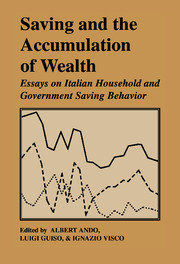Book contents
- Frontmatter
- Contents
- Foreword by Antonio Fazio
- List of contributors
- List of figures
- List of tables
- Acknowledgments
- Introduction
- I Saving trends, government deficit and demographic changes
- II Life-cycle saving and precautionary motives
- III Borrowing constraints, intergenerational transfers and bequests
- 9 Saving and borrowing constraints
- 10 Durables and non–durables consumption: evidence from Italian household data
- 11 Intergenerational transfers and capital market imperfections. Evidence from a cross–section of Italian households
- 12 Bequests and saving for retirement. What impels the accumulation of wealth?
- Appendixes
- Index
11 - Intergenerational transfers and capital market imperfections. Evidence from a cross–section of Italian households
Published online by Cambridge University Press: 05 May 2010
- Frontmatter
- Contents
- Foreword by Antonio Fazio
- List of contributors
- List of figures
- List of tables
- Acknowledgments
- Introduction
- I Saving trends, government deficit and demographic changes
- II Life-cycle saving and precautionary motives
- III Borrowing constraints, intergenerational transfers and bequests
- 9 Saving and borrowing constraints
- 10 Durables and non–durables consumption: evidence from Italian household data
- 11 Intergenerational transfers and capital market imperfections. Evidence from a cross–section of Italian households
- 12 Bequests and saving for retirement. What impels the accumulation of wealth?
- Appendixes
- Index
Summary
Introduction
It is a commonly held opinion that individuals are strongly motivated to develop non–market institutions to overcome, at least in part, market deficiencies. In a recent paper, Arnott and Stiglitz (1991) point out that where there is no market for insurance, individuals are prompted to develop unambiguously beneficial informal markets. They conclude that such informal markets, as those provided by arrangements within the family, are more likely to exist and to improve welfare in economies with less developed financial markets. In this paper we explore the validity of this general principle, in connection with the smoothing of consumption by individuals over their lifetimes.
According to modern theories of consumption, efficient capital markets are needed if the consumer is to be able to borrow against future income to finance current consumption. However, as Stiglitz and Weiss (1981) have shown, adverse selection and moral hazard may prevent people from borrowing the desired amount. The existence of such liquidity constraints may have important implications, especially in the context of the debt neutrality proposition (Barro, 1974), the optimality of progressive taxation (Hubbard and Judd, 1986), and the effectiveness of transitory tax levies.
In principle, borrowing constraints could be offset by a chain of operative intergenerational transfers targeted towards liquidity–constrained households. However, bequests are almost certain to be timed incorrectly: only chance can ensure that they occur precisely when liquidity constraints are binding.
- Type
- Chapter
- Information
- Saving and the Accumulation of WealthEssays on Italian Household and Government Saving Behavior, pp. 330 - 348Publisher: Cambridge University PressPrint publication year: 1994
- 1
- Cited by



